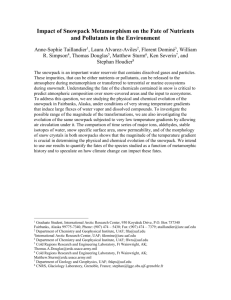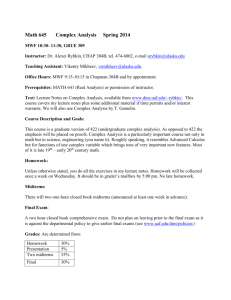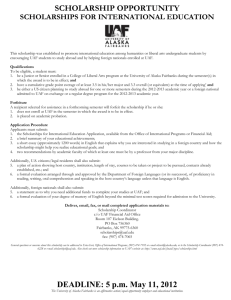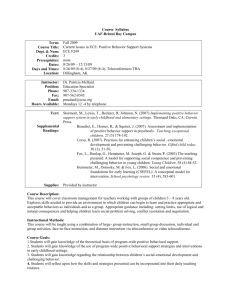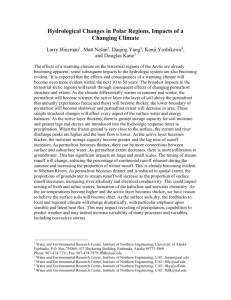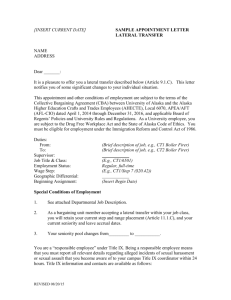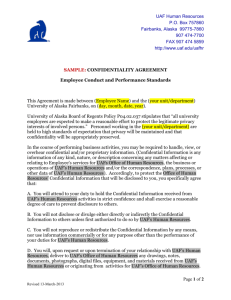Veterinarian - University of Alaska Fairbanks
advertisement
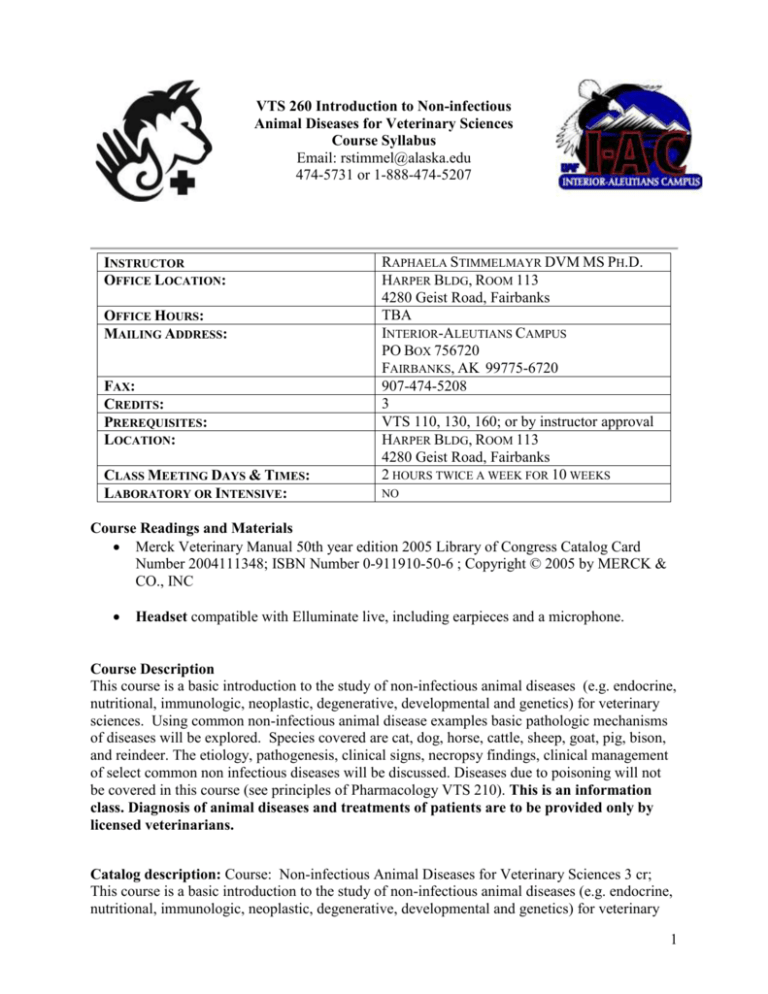
VTS 260 Introduction to Non-infectious Animal Diseases for Veterinary Sciences Course Syllabus Email: rstimmel@alaska.edu 474-5731 or 1-888-474-5207 INSTRUCTOR OFFICE LOCATION: OFFICE HOURS: MAILING ADDRESS: FAX: CREDITS: PREREQUISITES: LOCATION: CLASS MEETING DAYS & TIMES: LABORATORY OR INTENSIVE: RAPHAELA STIMMELMAYR DVM MS PH.D. HARPER BLDG, ROOM 113 4280 Geist Road, Fairbanks TBA INTERIOR-ALEUTIANS CAMPUS PO BOX 756720 FAIRBANKS, AK 99775-6720 907-474-5208 3 VTS 110, 130, 160; or by instructor approval HARPER BLDG, ROOM 113 4280 Geist Road, Fairbanks 2 HOURS TWICE A WEEK FOR 10 WEEKS NO Course Readings and Materials Merck Veterinary Manual 50th year edition 2005 Library of Congress Catalog Card Number 2004111348; ISBN Number 0-911910-50-6 ; Copyright © 2005 by MERCK & CO., INC Headset compatible with Elluminate live, including earpieces and a microphone. Course Description This course is a basic introduction to the study of non-infectious animal diseases (e.g. endocrine, nutritional, immunologic, neoplastic, degenerative, developmental and genetics) for veterinary sciences. Using common non-infectious animal disease examples basic pathologic mechanisms of diseases will be explored. Species covered are cat, dog, horse, cattle, sheep, goat, pig, bison, and reindeer. The etiology, pathogenesis, clinical signs, necropsy findings, clinical management of select common non infectious diseases will be discussed. Diseases due to poisoning will not be covered in this course (see principles of Pharmacology VTS 210). This is an information class. Diagnosis of animal diseases and treatments of patients are to be provided only by licensed veterinarians. Catalog description: Course: Non-infectious Animal Diseases for Veterinary Sciences 3 cr; This course is a basic introduction to the study of non-infectious animal diseases (e.g. endocrine, nutritional, immunologic, neoplastic, degenerative, developmental and genetics) for veterinary 1 sciences. Basic pathologic mechanisms of diseases will be explored using common noninfectious animal disease examples. Species covered are cat, dog, horse, cattle, sheep, goat, pig, bison, and reindeer. Topics: etiology, pathogenesis, management and general treatment options. Course Goals This course is seen as a continuation of VTS 160. The goal of this course is to provide students with a basic introduction to the subject of non-infectious animal diseases. Program students will be able to integrate prior coursework in anatomy/physiology, general biology, medical terminology and infectious animal diseases into their understanding of non-infectious animal diseases, in particular the complex field of endocrinopathies. Relevant examples of common non-infectious diseases of small animals (e.g. endocrine, degenerative, congenital, etc) and domestic livestock will be provided to explore on a case by case scenario a) the underlying pathophysiological mechanism of non-infectious animal disease and the associated clinical signs, b) diagnostics and treatment options, and c) preventative health measures Student Learning Outcomes: After successful completion of VTS 260 students will be able: To define and explain endocrine pathway disruptions and dysfunctions that lead to endocrinopathies. To explain how immune system anatomy and physiology relates with immunological disease mechanisms. To define and explain the role clinical pathology (e.g. clinical chemistry, cytology) plays in the diagnosis and monitoring of animal patients. To define and explain the basic clinical diagnostic techniques (e.g. physical exam and patient history; ultrasound; diagnostic imaging) and their clinical importance in internal medicine. To define common congenital and hereditary diseases and explain the importance of breed standards and genetic counseling for animal breeders. To define and explain the concept of breed disposition for specific diseases including neoplasia. To explore and relate clinical findings (e.g. anorexia, fever, dehydration, vomiting; pain, diarrhea, pruritus etc) in non-infectious diseases to the general principles of veterinary medicine treatment options (e.g. antimicrobial treatment, fluid therapy; antiinflammatories, pain medication, dietary, metabolic, and surgery etc) available. To define and explain the important role husbandry and basic nutrition play in modifying host susceptibility/ animal welfare and be familiar with the concept of husbandry/ management related diseases and animal wellbeing/welfare. To explain and define basic concepts of Stress physiology and the general role acute and chronic stress plays in animal diseases. 2 Instructional Methods: This course will be distance delivered using the Elluminate! Live software (interactive online video conference) with or without additional audio conferencing capabilities. Class material and exams are available via Blackboard. Classes are a combination of lecture and class-wide discussion. Classes will meet in the online classroom for lecture and interactive discussions. Students are responsible for reading the topics for the weekly presented class material in the Merck Veterinary Manual (e.g. Cushing’s disease pg. 435). Please have all assigned readings completed prior to lectures and before the start of class as they form the basis for that lecture’s discussion. 3 Course Calendar: This lecture schedule is fluid and may be updated during the semester. The instructor will inform students of changes in a timely manner. Students are responsible for keeping track of schedule changes once announced. Week Topic Metabolic, nutritional, and endocrine diseases of domestic species Week 1 Week 2 Week 3 Week 4 Week 5 Week 6 Week 7 Metabolic, nutritional, and endocrine diseases of domestic species Metabolic, nutritional and endocrine diseases of domestic species Immune system: p. 645 Immunologic Diseases of domestic species Cont. Unknown/multifactorial etiology and Degenerative Diseases of domestic species Musculoskeletal diseases: p. 844 Urinary system: p. 1267 Heart disease: p. 76 Cont. Unknown/multifactorial Etiology and Degenerative Diseases of domestic species Cancer biology and Cancer treatment options Week 10 Cont. Immunologic Diseases of domestic species Week 8 Week 9 Readings are from Merck Veterinary and supplemental material Metabolic disorders: p. 802 Endocrine system: p. 430 Digestive system: large animal p. 172 Small animals p. 307 Cont Common tumors in domestic animals by body system and species relevance Developmental & Genetic diseases of domestic species Neoplasia/Tumors by system see index p. 2665 Cont. Developmental anomalies by body system see index. p. 2598. Course Policies Students are expected to attend all class meetings. Contact the instructor as soon as possible before missing a class to let them know and make arrangements. Plagiarism Statement: All work submitted in this class must be your own work, generated exclusively for this class, and not work intended for submission in another course. The use of 4 sources (ideas, quotations, paraphrasing) should be properly documented. Please go to http://www.uaf.edu/library/instruction/handouts/Plagiarism.html for more information on how to avoid plagiarism or contact the Writing Center for assistance, they are there to help you. Assessment A. Short Tests: Bimonthy (every two weeks) assessments are given during this course. These assessments are based on 2 weeks of lectures. Format can be short essays, true and false and multiple choice questions. B. Final Exam: The final exam is comprehensive and is a take home. It can consist of case study scenarios, multiple choice questions, true and false questions, and/or labeling of diagrams chosen from the complete lecture topics. Point Totals and Grades will be assigned on the following basis: Number Attendance Bi-monthly assessment Final Exam Total 5 1 6 % of grade 10 60 30 100 A – 90% or more of total points (90/100 to 100/100) = an honor grade, indicates originality and independent work, a thorough mastery of the subject, and the satisfactory completion of more work than is regularly required. B – 80% to 89% of total points (80/100 to 89/100) = indicates outstanding ability above the average level of performance C – 70% to 79% of total points (70/100 to 79/100) = indicates a satisfactory or average level of performance D – 60% to 69% of total points (60/100 to 69/100) = the lowest passing grade, indicates work of below average quality and performance F – 59% or less of total points (<59.5%/100) = indicates failure to meet the lowest standard. Support Services The University has many student support programs. If you need assistance please contact any of the following service programs or departments. UAOnline http://uaonline.alaska.edu/ Your resource for transcripts, accounts, and other personal information. Rural Student Services http://www.uaf.edu/ruralss/ 5 Rural Student Services (RSS) is an academic advising department with over 35 years of experience in working with students from all over the state of Alaska. We are here to assist you in achieving student success by linking you to current information pertinent to your education, lifestyle, and goals. RSS is known for its welcoming and friendly environment. Many students find a meaningful connection at UAF through RSS. We can help you with: * Academic Requirements * Registration for Classes * Finding Financial Aid * Explaining Housing Options * Declaring a Major * Career Exploration CONTACT US AT: P.O. Box 756320, Fairbanks, AK 99775-6320 1-888-478-1452 (Toll Free within Alaska) or (907) 474-7871 Email us at fyrss@uaf.edu Math Help Line Contact UAF's toll-free Math Hotline for problem solving and math help. Call 866-823-6284 (1866-UAF-MATH) during regular fall and spring semesters. Writing Center http://www.alaska.edu/english/studentresources/writing/ The Writing Center is a student-staffed, student-oriented service of the English Department. 801 Gruening Bldg., P.O. Box 755720 Fairbanks, Alaska 99775-5720 Phone: (907) 474-5314 Fax: 1-800-478-5246 * The UAF Writing Center and Computer Lab offers free writing tutoring to any student in any subject via telephone and fax or over the Internet. Students can call 907-474-5314 for information on how to fax a paper and have it tutored over the telephone, or engage in an interactive Internet session. Both services are free. Library Services for off campus students http://library.uaf.edu/offcampus Off-Campus Library Services is a unit set up to serve rural UAF students and faculty who do not have access to appropriate information resources in their town or village. We work in support of The College of Rural & Community Development and The Center for Distance Education and Independent Learning. We can supply your information needs for the courses you are taking. For example, if a research paper is required in the teleconference or correspondence course that you are taking, you can contact us, explain your information need, and we will send library materials to you so that you can write your paper. Contact us at Off-Campus Services, Elmer E. Rasmuson Library 310 Tanana Loop, PO Box 756800 Fairbanks, Alaska USA 99775-6800 Phone: 1-800-478-5348 Email: fyddl@uaf.edu 6 For more off campus help go to: http://www.uaf.edu/library/instruction/ls101/other/Distance_Resources.html Computer, Internet, and software Problem: you cannot get your email Make sure your Internet connection is working; to test it, you can try to go to a new web page and see if it loads. If you are having problems with a UAF account, you will need to contact the UAF help desk 1.800.478.4667. If it is another company’s account, you will need to contact their customer support. There is very little we can do to assist you as we have no control or access to the computers that serve the email. Check with your email program’s Help. Problem: you forgot your password Only the organization that issued your password can do anything to change it. You will need to contact them. For UAF email and Blackboard it is the UAF help desk 1.800.478.4667. For most web services there is a link you can click if you forgot your password. I also recommend writing them down somewhere for back up. Problem: you are having problems with Blackboard You will need to contact the Blackboard administrator, at: http://classes.uaf.edu/ Office of Information Technology Help Desk 474.6564 or 1.800.478.4667 Elluminate Live If you have questions about Elluminate! Live I strongly encourage you to visit the following pages: http://community.uaf.edu/ehelp Steps needed to prepare you for your first distance education course session. http://distance.uaf.edu/archives/research/subresearch/elluminate-live.php There you will find a direct link to Elluminate! Server how to connect your headphone/microphone to your computer help finding and activating you UAF ID a printable quick reference guide Disabilities Services The Veterinary Sciences Program will work with the Office of Disability Services to provide reasonable accommodation to students with disabilities. Disability Services provide a variety of services to assure equal access for all students. Interpreting services, educational assistants, note 7 taking, and exam accommodations for students are the most frequently provided accommodations. Disability services also provides assistance to the university's rural campuses; Tanana Valley Campus, Bristol Bay, Chukchi, Interior-Aleutians, Kuskokwim, and Northwest. The staff of Disability Services works with faculty in arranging appropriate services in the classroom. Questions should be directed to the Director of Disability Services at (907)-474-5655. http://www.uaf.edu/disability/ UAF Office of Disability Services 612 N. Chandalar, PO Box 755590 University of Alaska Fairbanks Fairbanks, Alaska 99775-5590 Phone: (907) 474-5655 | TTY: (907) 474-1827 | Fax: (907) 474-5688 | E-mail: fydso@uaf.edu A Division of Student and Enrollment Services (SES) UAF is an affirmative action/equal opportunity employer and educational institution. 8
